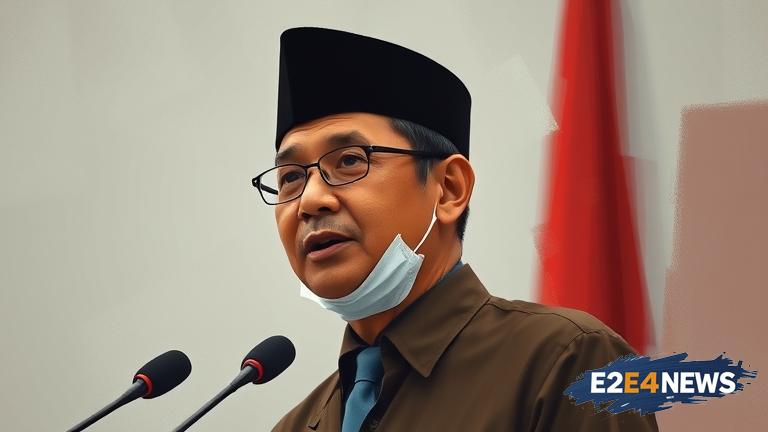The Indonesian Manpower Minister has recently introduced a range of reforms aimed at improving the country’s labor sector. This move comes after a deputy minister was implicated in a graft scandal, prompting the minister to take swift action to restore public trust. The reforms are designed to increase transparency and accountability within the ministry, as well as to enhance the overall efficiency of its operations. One of the key measures being implemented is the establishment of a new task force, which will be responsible for monitoring and evaluating the ministry’s performance. This task force will be comprised of representatives from various stakeholders, including labor unions, employer organizations, and government agencies. The minister has also announced plans to introduce new regulations and policies aimed at promoting fair labor practices and protecting the rights of workers. Additionally, the ministry will be increasing its efforts to combat corruption and ensure that all officials are held to the highest standards of integrity. The reforms have been welcomed by labor unions and other stakeholders, who have praised the minister’s commitment to transparency and accountability. However, some have expressed concerns that the reforms may not go far enough in addressing the underlying issues that led to the graft scandal. The minister has acknowledged these concerns and has pledged to continue working to address them. The reforms are part of a broader effort by the Indonesian government to improve the country’s business environment and attract foreign investment. The government has also introduced a range of other initiatives aimed at promoting economic growth and reducing corruption. These initiatives include the establishment of a new anti-corruption agency and the introduction of new laws and regulations aimed at increasing transparency and accountability. The Indonesian Manpower Minister’s reforms have been seen as a positive step towards improving the country’s labor sector and promoting fair labor practices. However, the minister faces a number of challenges in implementing the reforms, including resistance from some officials and stakeholders. The minister has pledged to work closely with all stakeholders to ensure that the reforms are successful and that the rights of workers are protected. The reforms have also been welcomed by the international community, with many countries praising Indonesia’s commitment to transparency and accountability. The Indonesian government has also announced plans to increase its cooperation with international organizations and other countries to combat corruption and promote fair labor practices. Overall, the reforms introduced by the Indonesian Manpower Minister are a significant step towards improving the country’s labor sector and promoting economic growth. The minister’s commitment to transparency and accountability has been praised by stakeholders and the international community, and the reforms are expected to have a positive impact on the country’s business environment. The reforms are also expected to improve the lives of workers and promote fair labor practices, which will have a positive impact on the country’s economy and society as a whole. The Indonesian government’s efforts to combat corruption and promote transparency and accountability are ongoing, and the reforms introduced by the Manpower Minister are an important part of these efforts. The minister’s reforms have set a positive example for other government agencies and ministries, and are expected to contribute to a more transparent and accountable government. The reforms have also highlighted the importance of international cooperation in promoting fair labor practices and combating corruption. The Indonesian government’s commitment to transparency and accountability has been recognized by the international community, and the country is expected to continue playing a leading role in regional and global efforts to promote fair labor practices and combat corruption.
